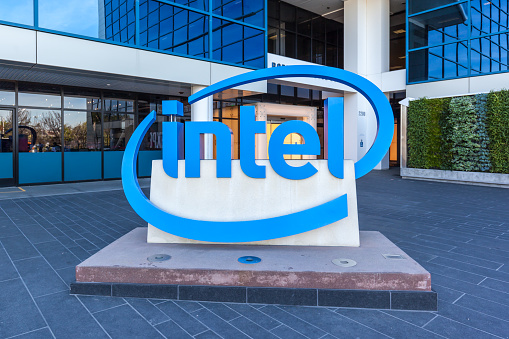What Wall Street Is Saying About Intel Ahead Of Earnings

Intel (INTC) is scheduled to report results of its second fiscal quarter after the market close on July 28, with a conference call scheduled for 5:00 pm ET. What to watch for:
1. GUIDANCE: Along with its last report, Intel guided for Q2 adjusted earnings per share of 70c on revenue of roughly $18B. At the time, analysts were expecting the company to report Q2 EPS of 83c on revenue of $18.38B, but those figures have since fallen to 69c and $17.92B, respectively.
2. CITI: Last week, Citi analyst Christopher Danely opened a "negative catalyst watch" on Intel into the company's' earnings report. He sees downside to consensus estimates and keeps a Neutral rating on the shares with a $45 price target. Based on client conversations, it appears investors are "not overly bearish" on Intel given the likelihood of government assistance, Danely told investors in a research note.
3. DEUTSCHE: Additionally, Deutsche Bank analyst Ross Seymore last week lowered the firm's price target on Intel to $45 from $55 and maintained a Hold rating on the shares. The ongoing "purgatory" stage of the semiconductor cycle continues heading into the Q2 earnings season, Seymore told investors in a research note. Despite expecting positive fundamental strength across the majority of the sector in Q2 and Q3, the analyst said that investors appear to be waiting for a "widespread deck-clearing" guide-down before getting back into semi stocks. Seymore is now "more actively factoring in accelerating macro/sector headwinds" into his 2023 estimates, reducing revenue/earnings/price targets by an average of 4%/10%/14%.
4. CHIP ACT: Yesterday, the U.S. Senate approved bipartisan legislation on Wednesday to make the American semiconductor manufacturing industry stronger and more competitive with rivals like China, according to CNN. The bill will go to the House of Representatives next and if approved there, to the President's desk for final a signing. "The legislation is aimed at addressing a semiconductor chip shortage and making the U.S. less reliant on other countries such as China for manufacturing. Supporters say the measure is important not only for U.S. technological innovation, but for national security as well," noted CNN.
As investors' eyes are on the potential passage of the so-called CHIPS Act, Baird analyst Tristan Gerra said that the bill, which includes $52B in subsidies for domestic semiconductor production, will unlikely change supply/demand dynamics near-term, but could have a deflationary impact on semiconductor stocks medium term as it will ultimately address the trend of supply shortages. Of note, the analyst said the the bill vindicates Intel's Foundry Services effort and the motivation from many fabless companies, including foreign ones, to diversify manufacturing into U.S. soil using Intel's manufacturing capabilities.
More By This Author:
Here's What Wall St. Experts Are Saying About Amazon Ahead Of Earnings
Here's What Wall Street Is Saying About Qualcomm Ahead Of Earnings
Teva Announces $4.25b Opioid Agreement With States, Native American Tribes
Disclosure: None



